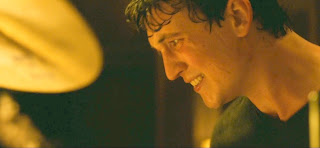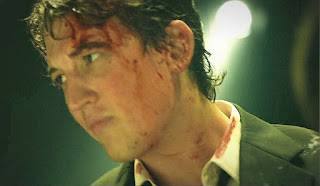Submerging oneself in the recently released Whiplash soundtrack—which includes classic jazz standards like Duke Ellington's Caravan and Stan Getz's Intoit—and the compilation Complete Buddy Rich: 1946-1956/1957-1962, it's easier to connect with Charlie Parker's ghost. Bird became an obsession for genius drummer Andrew Neiman (Miles Teller) in the three-Oscar-winner film Whiplash (2014). In Kansas City Lightning: The Rise and Times of Charlie Parker (2013), the biographer Stanley Crouch affirmed: "Charlie Parker knew how to listen and hear, instant by instant, and how to respond with aesthetic command to that instant, gone now and never to return."
By comparing Damien Chazelle's milestone Whiplash with Sundance Film Festival's darling The Spectacular Now (which earned Miles Teller and Shailene Woodley the Special Jury Award for Dramatic Acting in 2013), we'll notice many similarities between their outwardly disparate filmic concepts.
Terence Fletcher (J.K. Simmons), the ruthless jazz instructor at Shaffer, transforms Andrew's admiration for Buddy Rich into Charlie Parker's renewed greatness, turning a dangerously unhealthy obsession into predetermined and irrevocable success, whatever the cost may be. In Andrew's case, the resurrection of Charlie Parker's spirit will bestow on him an absolute dissociation with the world outside of music. In real life, Parker maintaned an obscure business relationship with his benefactor Ross Russell and was committed to Camarillo State Mental Hospital in 1946 after his "Lover Man" breakdown, echoing the parallel confrontation between Neiman and Fletcher in the film.
No family or girlfriend can rescue the lost innocence of Andrew Neiman, who will exist virtually outside of society from then on, having ceased to distinguish between passion and madness, love and hate, humanity and cruelty. But nothing will ever tarnish the legendary magnitude of his triumph in that sublime instant that's never to return, and that's why genuine art is often so strange and scarce. That painful divorce of heart and reason in Whiplash was narrated in more relatable terms through Teller's performance as Sutter Keely in The Spectacular Now the previous year.
A high school senior bereft of ambition or plans for the future, only fortified by his abuse of alcohol and fake parties, Sutter Keely casually meets introverted A-student Aimee Finecky (Shailene Woodley), whom he vows to save from her downtrodden life: "I’m not a lifestyle accessory to her. I’m a necessity. I’m the guy that’s going to crack open her cocoon. She doesn’t need to change me—she needs me to change her. At least until her little butterfly wings get strong enough to fly away."
The same focus on the need of saving someone from affliction or mediocrity was manifested in the reveal that Andrew finally obtains from Fletcher in a rare bonding moment: "I wasn’t [at Shaffer] to conduct. No, it’s about pushing people beyond what’s expected of them. And I believe that is a necessity. Because without it you’re depriving the world of its next Armstrong. Its next Parker."
In the scene when Andrew's ex-girlfriend Nicole, an unambitious theatre concessionist, confesses to him on the phone she's dating another man and she will not come back, Chazelle's script says: "You can see it in Andrew’s eyes - real hurt. And surprise at how hurt he feels."
Sutter, unlike Andrew, is not surprised by the feeling of hurt, he simply has learned to hide it socially. "God’s own drunk... he’s looking out for you in your beautiful intoxication but you end up spending half the day feeling like the Antichrist when the fact is you didn’t do a thing to hurt a soul."
When Andrew makes love to Aimee (she's been sexually victimized in the past and Andrew behaves cautious yet nonchalant about it), he feels for the first time something more than sexual pleasure, a painful sensation he cannot conceal: "I look down at her face. Suddenly, I feel all the layers that have grown over my own purity stripping away. The faster we go, the more layers burn away, until magic time hits, and there’s nothing left but the original me, as pristine as her body, shining and glorious."
The final solo scene in Whiplash: "It’s unlike anything we’ve ever seen... 450 beats per minute... trying to go even faster... trying to reach that mythical place where only the greats live... Andrew tearing a hole through the stage, blood gushing from his hands and staining the cymbals... A second of pure silence. Fletcher turns to the band, raises his hand... and cues the final note. The whole band roars it out, horns hitting their highest C’s, and Andrew rolling around his drum set like a madman, eyes about to pop, the next Buddy Rich, Fletcher’s only Charlie Parker on that very last hit of hits... cut to black."
Sutter's most pessimistic observations are found in the Chapter 66 of Tim Tharp’s novel The Spectacular Now: "We’re not the Faster-than-the-Speed-of-Light Generation anymore. We’re not even the Next-New-Thing Generation. We’re the Soon-to-Be-Obsolete Kids, and we’ve crowded in here to hide from the future and the past. We know what’s up—the future looms straight ahead like a black wrought-iron gate and the past is charging after us..."
An experiment conducted by the neuroscientist David Eagleman in 2010 on time perception in drummers illustrated that drummers have different brains from the rest of us: "Establishing the beat is a drug for drummers," Brad Henderson (author of Drums: A Novel) concluded.
Andrew Neiman and Sutter Keely both probably suffer from depression and alexithymia. According to psychoanalyst Joyce McDougall, the disaffected individuals "experienced overwhelming emotion that threatened to attack their sense of integrity and identity." Jazz and alcohol are indulged thus methodically in order to numb their emotional damages. Sutter masks his psychogenic unrest with a blasé party-boy façade whilst Andrew unmasks the secrets of artistic greatness, whose center is sheer bright pain. Sutter swaps his own happiness for Aimee's future.
Andrew sacrifices part of his soul for brief immortality. Their stories simultaneously mutate into a prolonged coda that marks their slow-tempo self-destruction, a shut-down from the outside world that they'll enact as the ultimate form of compassion towards others. Miles Teller nails both performances without missing a beat: 'bad boy' Sutter who courts redemption in The Spectacular Now, and the remoteness of the genius in Whiplash.
Published previously as In ‘Whiplash’ and ‘The Spectacular Now,’ Miles Teller Isn’t Missing a Beat on Blogcritics.



























No comments :
Post a Comment